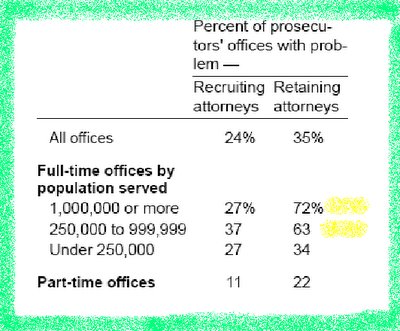The Bureau of Justice Statistics has a new, 12-page report on Prosecutors in State Courts, 2005.
Presents findings from the 2005 National Survey of Prosecutors, the latest in a series of data collections about the Nation's 2,300 State court prosecutors' offices that tried felony cases in State courts of general jurisdiction. This study provides information on the number of staff, annual budget, and felony cases closed for each office. Information is also available on the use of DNA evidence, computer-related crimes, and terrorism cases prosecuted. Other survey data include special categories of felony offenses prosecuted, types of non-felony cases handled, number of felony convictions, number of juvenile cases proceeded against in criminal court, and work-related threats or assaults against office staff.Thinking about a job in a prosecutor's office? A quarter or more of offices report having trouble recruiting staff attorneys, and most medium and large office have trouble retaining staff attorneys. Here are the numbers:
Highlights include the following:
- At least two-thirds of the State court prosecutors had litigated a computer-related crime such as credit card fraud (80%), identity theft (69%), or transmission of child pornography 967%).
- A quarter (24%) of the offices participated in a State or local task force for homeland security; one-third reported an office member attended training on homeland security.
- Most prosecutors (95%) relied on State operated forensic laboratories to perform DNA analysis, with about a third (34%) also using privately operated DNA labs.

What the statistics don't tell us is why the offices have the problems.
- Do they have a hard time recruiting because bright and capable students don't apply? I wouldn't guess that, based on the students I meet who say they'd like to work in a prosecutor's office.
- Is it about location? Are the offices with trouble recruiting in cities and towns that law students and young attorneys don't consider when they're looking for jobs? Law students and lawyers come here to Seattle from all over -- but is that as true of Duluth, Tulsa, and Norfolk? If the problem is location, can the offices improve recruiting with a little PR? Certainly law students who are having trouble finding their dream jobs in their favorite cities might do well to stretch widen their sights geographically. (I have friends in each of those cities, by the way.)
- Do prosecutor's offices have trouble offering salaries that are competitive with the private sector? If so, would recruiting be improved by better budgets? By more loan repayment assistance programs?
- What about retention? Is the problem burnout? If so, then what could be done to make the job something for the long haul?
- If the problem is salaries, then we're back to budgets, LRAP, etc.
- Do some attorneys only plan to work as prosecutors long enough to get enough experience to market themselves elsewhere? Is that really a problem, as long as some core of experienced people sticks around?
So far, there have been few comments posted on this blog, but they are very welcome! I moderate comments to avoid spam, but if a comment is on topic and reasonable for public consumption, I'll gladly post it.
Thanks: beSpacific.
Filed in: prosecutors, statistics, Justice-Department, DNA, terrorism, practice-of-law, law-students, LRAP, notes-about-the-blog

No comments:
Post a Comment